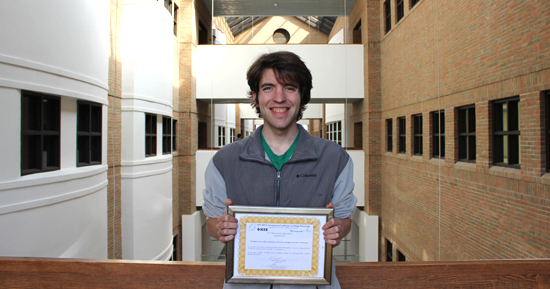Research that will lead to sharper photos earns best paper award
The method they developed compares favorably with the best of current techniques, while being faster and easier.

 Enlarge
Enlarge
Research by Dr. Paul Shearer, Prof. Alfred O. Hero, III and Prof. Anna Gilbert, earned Best Paper Award at the 2013 IEEE International Conference on Image Processing (ICIP). The paper was entitled Correcting camera shake by incremental sparse approximation.
The researchers tackled the problem of “camera shake,” which is inevitable in cases where a tripod is either not available or practical for taking pictures.
As the authors stated, “the problem of deblurring an image when the blur kernel is unknown remains challenging after decades of work. Recently there has been rapid progress on correcting irregular blur patterns caused by camera shake, but there is still much room for improvement. We propose a new blind deconvolution method using incremental sparse edge approximation to recover images blurred by camera shake. We estimate the blur kernel first from only the strongest edges in the image, then gradually refine this estimate by allowing for weaker and weaker edges.”

 Enlarge
Enlarge
The photos above compare the authors’ method of correcting for camera shake (above right) with the original image, the blurred image without any correction, and the results of image correction using two contemporary state-of-the-art techniques (Methods 1 and 2).
The method they developed compares favorably with the best of current techniques to deblur photos, while being significantly faster and easier to generalize.
The research was led by Al Hero, the R. Jamison and Betty Williams Professor of Engineering. Prof. Hero conducts research in statistical signal processing, bioinformatics and imaging. His research impacts a wide range of applications, including astronomical data, network data, biomedical diagnostics and predictive health.
Prof. Gilbert is a professor of mathematics; she collaborates with EECS faculty on a variety of research involving signal and image processing, compressive sensing, and massive datasets.
Paul Shearer received his Ph.D. in Applied and Interdisciplinary Mathematics in 2013, and is currently a research fellow at U-M in the department of Atmospheric, Oceanic and Space Science.
 MENU
MENU 
